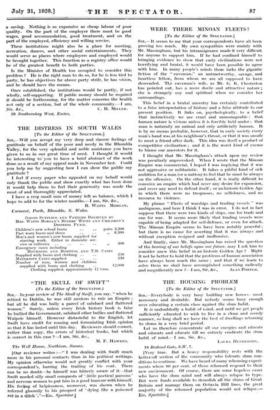WERE THERE MINOAN FLEETS ?
[To the Editor of the SPECTATOR.] SIR,—It seems to me that your correspondents have all been -proving too much. My own sympathies were mainly with Mr. Massingham, but his intransigeance made it very difficult for anyone to support him. If he had confined himself to bringing evidence to show that early civilizations were not horrifying and brutal, it would have been possible to agree with him. In many people's minds there lurks the gigantic .fiction of the " caveman," an untrustworthy, savage, and heartless fellow, from whom we are all supposed to have descended. The caveman's wife, as Mr. G. K. Chesterton has pointed out, has a more docile and attractive nature ; she is strangely coy and spiritual when we consider her surroundings.
This belief in a brutal ancestry has certainly contributed to a false interpretation of history and a false attitude to our present position. It links on, psychologically, to a belief that instinctively we are cruel and unmanageable ; that human nature is vicious unless it is forcibly held under ; that man is naturally an animal and only artificially human. It is by no means probable, however, that in earl• society every man's hand was at his neighbour's throat, or that it was unsafe to meet a friend after dark. This idea was itself a product of competitive civilization ; and it is the worst kind of excuse to blame our ancestors for it.
I thought that Mr. Massingham's attack upon my review was peculiarly unprovoked. When I wrote that the Minoan Empire was commercial, I hoped I was implying that it was not aggressive or militaristic. It takes a pitiful kind of sick ambition for a man (or a nation) to feel that he must be always on the offensive. On the other hand, it is really difficult to conceive an empire which had never any desire for expansion, and never any need to defend itself ; or an historic Golden Age in which there were no trespasses, no selfishness, and no recourse to violence.
My phrase " Fleets of warships and trading vessels " was ambiguous; and here I think I was in error. I do not in fact suppose that there were two kinds of ships, one for trade and one for war. It seems more likely that trading vessels were capable of being adapted for self-defence, or even for attack. The Minoan Empire seems to have been notably peaceful ; but there is no cause for asserting that it was always and without exceptiOn resigned and inoffensive.
And finally, since Mr. Massingham has raised the question of the bearing of our beliefs upon our future, may I ask him to consider anew this belief in an historic Golden Age ? Might it not be better to hold that the problems of human association have always been much the same ; and that if we learn to solve them we shall have accomplished something radically and magnificently new ?—I am, Sir, &c., ALAN PORTER.




















































 Previous page
Previous page